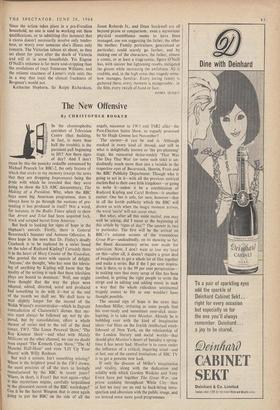The New Offensive
By CHRISTOPHER BOOKER
IN the claustrophobic corridors of Television Centre (that building, in fact, is more than half the trouble), is the paranoid pall beginning to lift? Are there signs of day? And I don't mean by this the panicky reshuffle announced by Michael Peacock for, BBC-2, the only feature of which that sticks in my memory (except the news that they are dropping Impromptu) being the pride with which he revealed that they were going to show the US ABC documentary, The Making of a President. Why, when the BBC ,buys some big American programme, does it always have to go through the motions of pre- tending it has produced in itself? Not a word, for instance, in the Radio Times splash to show that Arrest and Trial had been acquired lock, stock and scraped barrel from America. But back to looking for signs of hope in the elephant's entrails. Firstly, there is General Baverstock's Summer and Autumn Offensive. Is there hope in the news that Dr. Finlay's deadly Casebook is to be replaced by a series based on the tales of Rudyard Kipling? Certainly there is in the heart of Mary Crozier of the Guardian, Who greeted the news with squeals of delight. 'Anyone,' she thought, 'who has seen the televis- ing of anything by Kipling. will know that the quality of the writing is such that these television Plays are bound to dominate.' Well, one might have thought that the way the plays were adapted, edited, directed, acted and produced had something to do with it—but at the end of the month we shall see. We shall have to wait slightly longer for the second of the Welsh Wizard's masterstrokes—which in flagrant contradiction of Clausewitz's dictum that suc- cess must always be followed up, not by dis- persal, but by consolidation, offers a whole shower of series tied to the tail of the dead Comet, TW3. 'The Lance Perceval Show,' Roy Kinnear Show'—and what with Mainly Millicent on the other channel, we can no doubt soon expect 'The Kenneth Cope Show,' Al Mancini Half-Hour' and even 'Lift Up Your Hearts' with Willy Rushton. But wait a minute. Isn't something missing? Where is the brightest jewel in the TW3 crown, the most precious of all the stars so lovingly Manufactured by the BBC in recent years? Where, in short, is Frost? But wait again—what is this mysterious engine, carefully tarpaulined in the gloomiest cavern of the BBC workshops? Can it be the Secret Weapon that is once again Coing to put the BBC on the side of all the angels, successor to TW3 and TSR2 alike—the Post-Election Satire Show, so vaguely promised by Sir Hugh Greene last November? The answer—it can be and is. Although masked in every kind of shroud, and still in what is delightfully known as 'the pre-planning' stage, the rumoured thrice-weekly 'That Was The Day That Was' (or some such title) is un- doubtedly much more than just a twinkle in the respective eyes of Baverstock, Sherrin, Frost and the BBC Publicity Department. Though who is going to act in it—with all the previous satirical starlets fled to their own little kingdoms—or going to write it—unless it be a combination of Rudyard Kipling and Caryl Brahms—is another matter. One bet is safe, for sure, however—that in all the lavish publicity which the BBC will drown us with when the magic moment arrives, the word 'satire' will not occur once.
But what, after all this snide recital, you may well be asking, did I mean at the beginning m of this article by 'signs of day'? The answer is, two in particular. The first will be the arrival on BBC-1's autumn screens of the tremendous Great War—undoubtedly, on its showing so far, the finest documentary series ever made for t television. Now, I don' want to lose my head on this—after all, it doesn't require a great deal of imagination to get a whole lot of film together and make a series. But if the 1 per cent inspira- tion is there, so is the 99 per cent perspiration— in making sure that every scrap of film has been combed, in getting the right people to write the script and in editing and adding music in such a way that the whole ridiculous sentimental tragedy comes to life as one wouldn't have thought possible. The second sign of hope is the news that Jonathan Miller, irritating as some people find his ever-ready and sometimes over-slick socio- logising, is to take over Monitor. Already he is bubbling over with the kind of imaginative ideas—for films on the Jewish intellectual estab- lishment of New York, on the relationship of the London literary and social worlds—that should give Monitor's desert of banality a spring- time it has never had. Monitor is to come under the influence of a critical, inquiring mind—and at last, one of the central institutions of BBC TV is to get a genuine new look. If only the diseases of Miller's imagination and vitality, along with the dedication and solidity with which Gordon Watkins and Tony Essex have put together The Great War, can prove catching throughout White City--then then at last we may see an, end to back-biting intro- spection and obsession with the public image, and see instead some more good programmes.


































 Previous page
Previous page